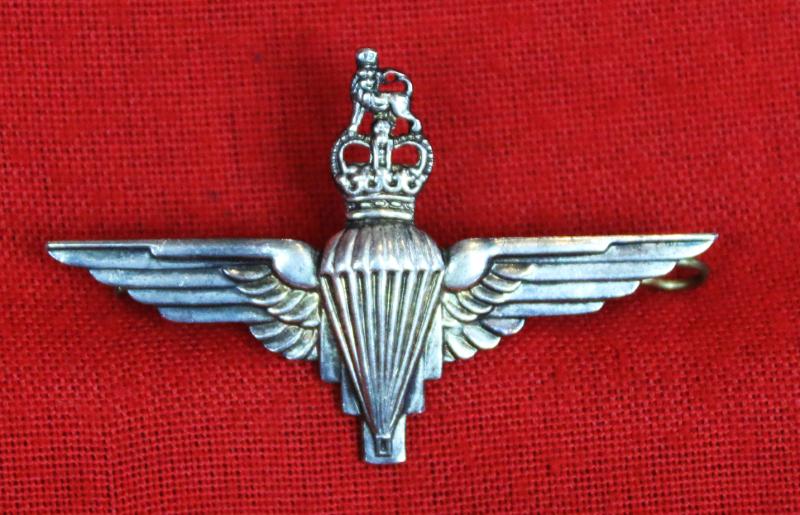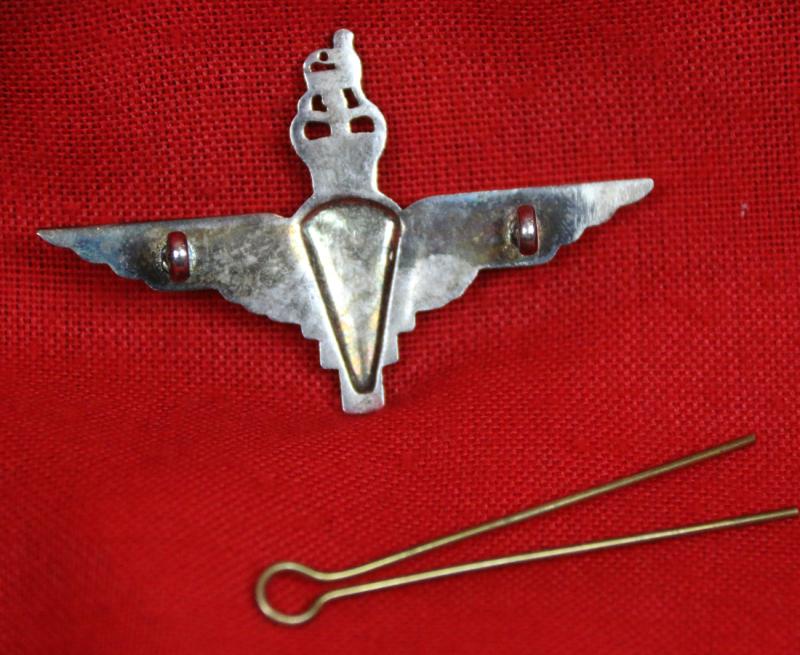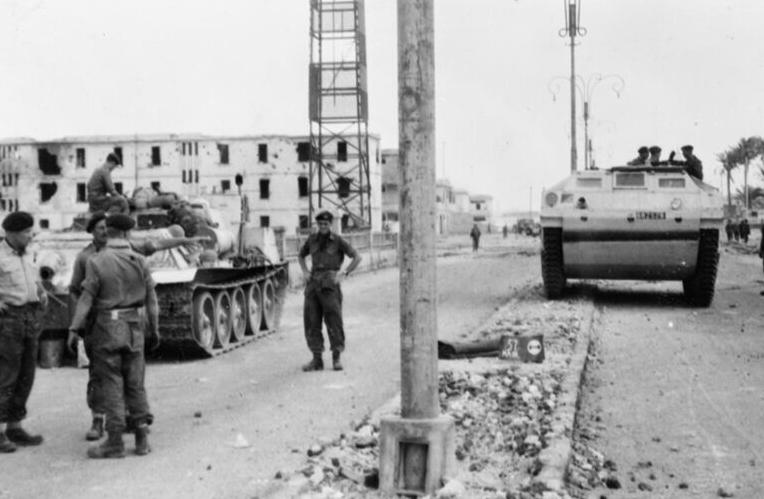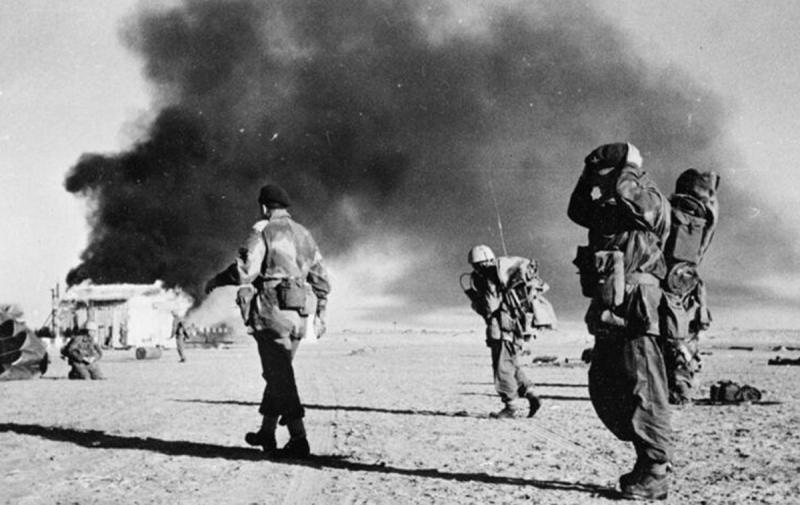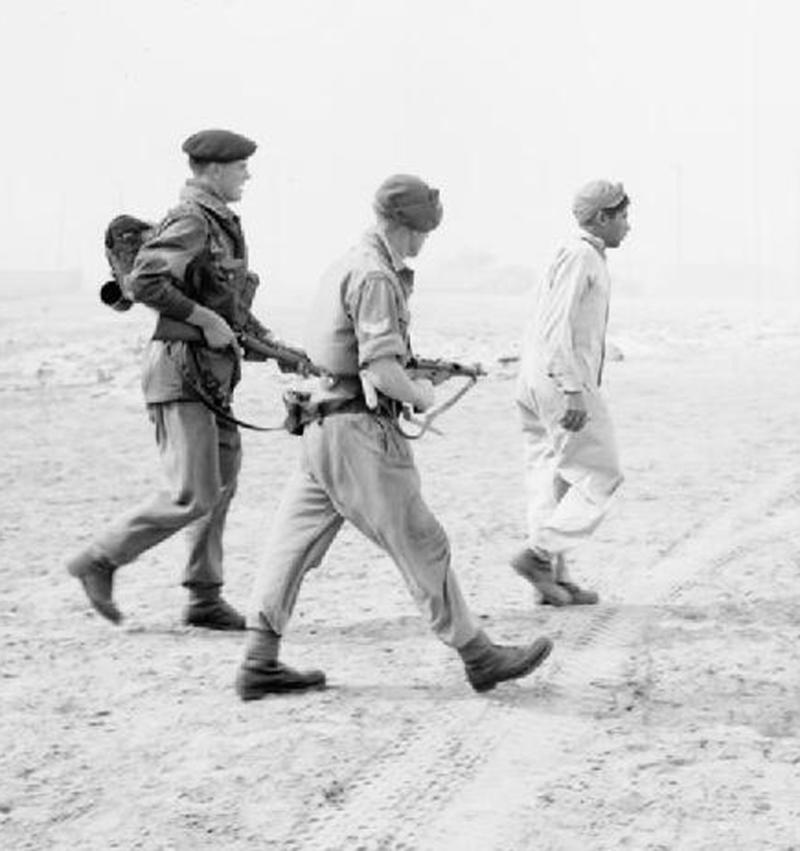A Good Silver Parachute Regiment Officer's Cap Badge 3rd Battalion Parachute Regt. Suez Campaign. Operations Telescope & Musketeer. A Franco-British Victory, Confounded by a Political Blunder
Circa 1953. Superb quality and condition with traditional officer's split-pin twin mounting loops.
Operation Telescope was a Franco-British operation conducted from 5 to 6 November 1956 during the Suez Crisis, consisting of a series of parachute drops launched by the British Parachute Brigade, in combination with French paratroop forces, 24 hours before the seaborne landing on Port Said during Operation Musketeer. Troops dropped onto Gamil airfield and Port Fuad to secure airfields and prevent Egyptian forces from providing air defence. It was put forward by the deputy Land Task Force Commander General André Beaufre under the original name Omelette which included many more drops but was adapted due to British fear of another failure like Arnhem and a lack of aircraft able to deploy paratroopers.
The capture of the airfield at El Gamil and the surrounding area was an essential element in Operation Musketeer, the joint Anglo-French airborne and amphibious assault on Port Said, with the ultimate aim of gaining control of the Suez Canal. The French 2nd Colonial Parachute Regiment were to land at Er Raswa while the 3rd Battalion, Parachute Regiment, part of 16th Independent Parachute Brigade, were tasked with the attack on El Gamil, which would be the first British battalion parachute assault since World War II and the last to date. At the insistence of French commanders, the airborne assaults on El Gamil and Raswa were to take place a full 24 hours before the arrival of the seaborne element, in order to preserve the element of surprise, as it would be difficult to conceal the approach of the large invasion fleet.
Before the landing, the British launched airstrikes on Egyptian defensive positions around the battlefield, effectively neutralizing many of them. Still, as 3. PARA landed at 0515 GMT, they came under fire, unable to return it until they had retrieved the caches with their weapons. Egyptian fire was inaccurate however, and ultimately the British suffered very few casualties.
At 0515 GMT on 5th November 3 PARA conducted the first and last battalion sized operational parachute assault since the Second World War. Despite vigorous defensive fire El Gamil airfield was captured in 30 minutes. Vicious close-quarter fighting developed as the paratroopers continued the advance through a sewage farm and cemetery nearby, rolling up Egyptian coastal defences. Covering fire was provided to support the amphibious landings that arrived the next day and a successful link-up with 45 Commando achieved.
The British lacked heavy support equipment, but the small arms and light AT and support weapons they had were more than adequate to take the airfield, the AT being particularly effective at knocking out four concrete pillboxes. Other than these bunkers, the Egyptians withdrew to favourable terrain to avoid annihilation at the hands of the superior British forces. The Egyptians' three SU-100 self-propelled guns proved to be particularly difficult for the PARAs.
3. PARA then moved onto Port Said, surviving a friendly fire incident with French planes who strafed them. B Company captured the sewage works which provided cover from Egyptian snipers, however, not wanting to push forward and storm the highly defensible Coast Guard Barracks, they called in air support in the form of Wyverns who dropped bombs on the position for the loss of one aircraft and inflicting heavy casualties. Running out of ammo however, the British retreated to the sewage works.
16 km to the southeast, the French 2. RPC achieved a lot more success, managing to take the Western span of the Rawsa Bridges (rendered inoperable by damage) and the Said waterworks, cutting off the supplies into the city. With supplies cut off and a potential chokepoint captured by mid-morning, the French had achieved all their objectives on the first day.
Following the unsuccessful negotiation of a ceasefire during the night, C Company was sent to capture the cemetery at 0510 GMT, which was completed without opposition. This was followed up by an assault on the Coast Guard building from which a considerable amount of sniper fire was coming. The building was captured by 0800 with no casualties whereupon they were ordered to capture a hospital to complete the link up with 45 Commando.
In the closing stage of the battle, a patrol of four men was ambushed and injured by Egyptian fire whereupon a medical officer, Captain Elliot rescued them under heavy fire for which he was awarded the Military Cross.
‘Our quarrel is not with Egypt, still less with the Arab world. It is with Colonel Nasser. He has shown that he is not a man who can be trusted to keep an agreement. Now he has torn up all his country's promises to the Suez Canal Company and has even gone back on his own statements. ‘We cannot agree that an act of plunder which threatens the livelihood of many nations should be allowed to succeed. And we must make sure that the life of the great trading nations of the world cannot in the future be strangled at any moment by some interruption to the free passage of the canal.’
PRIME MINISTER SIR ANTHONY EDEN — 8 AUGUST 1956
Not hallmarked.
Code: 25678
140.00 GBP

